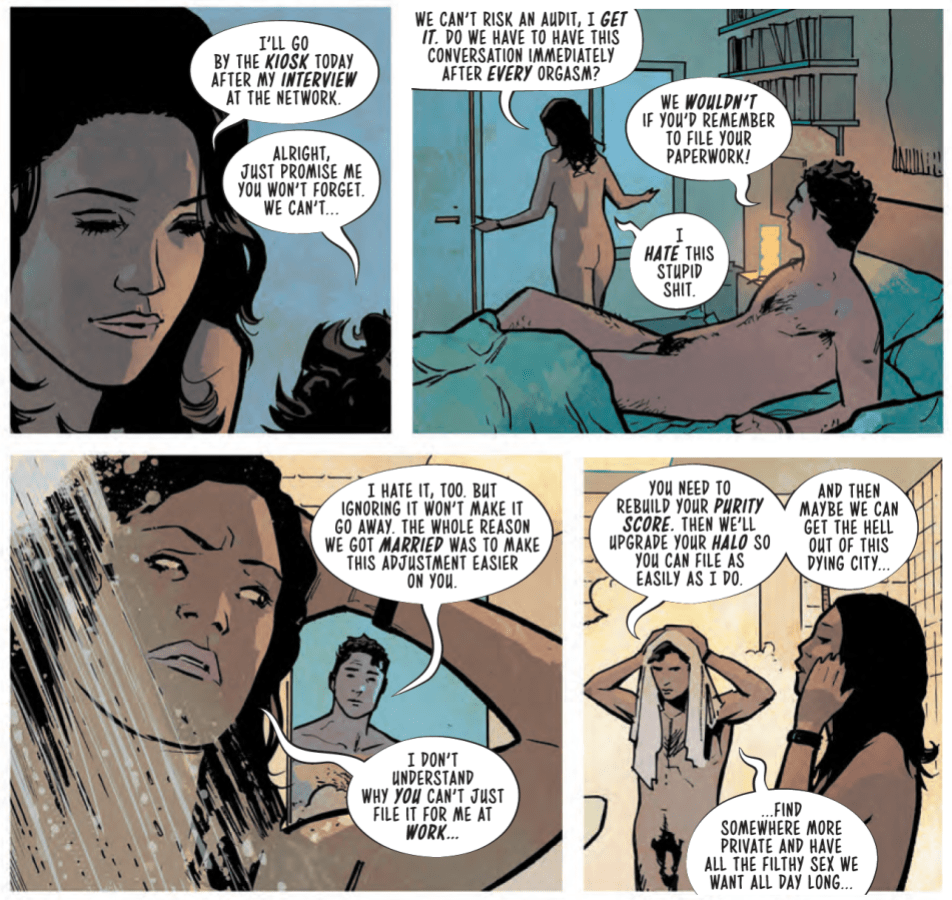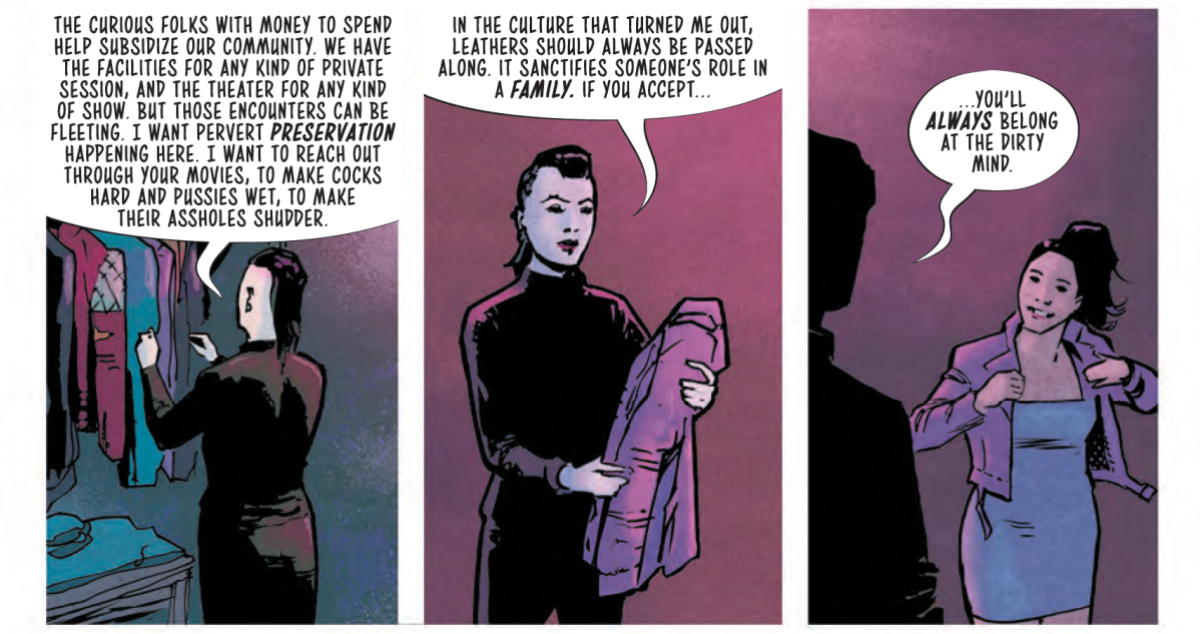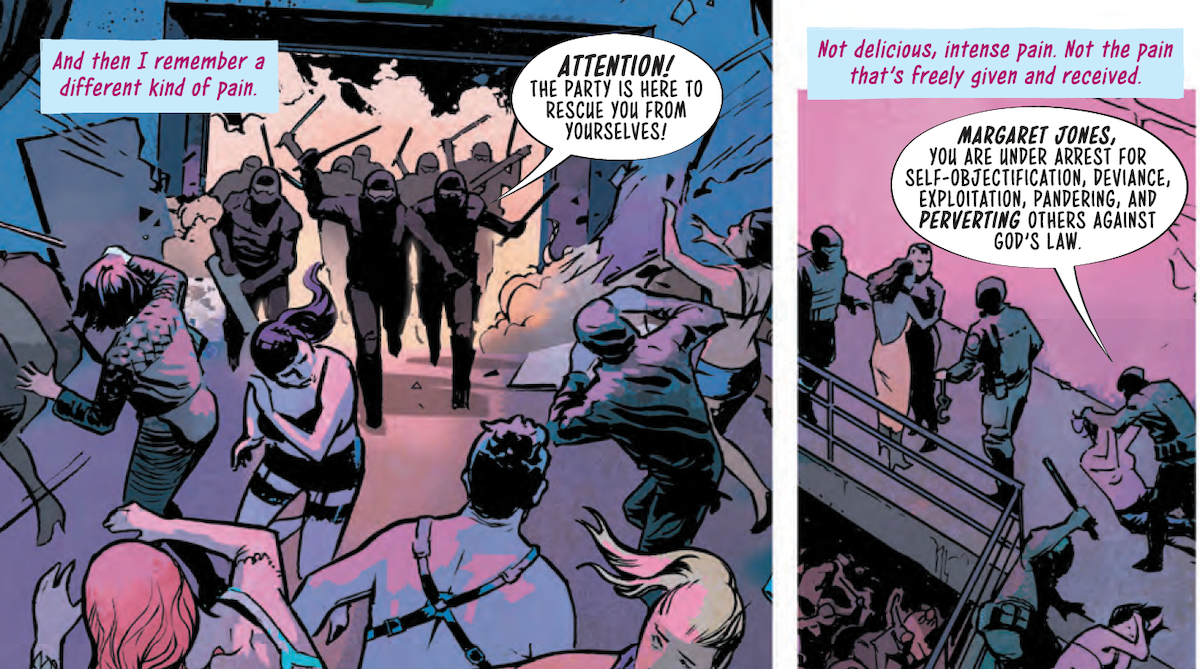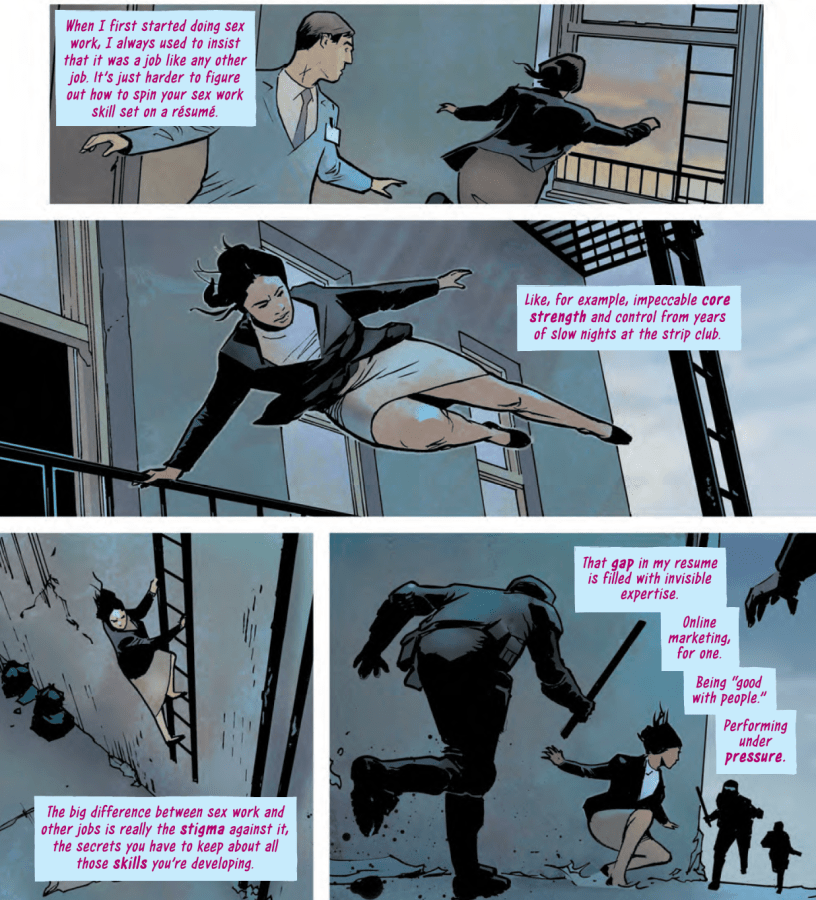SFSX (pronounced “safe sex”) is, in creator Tina Horn’s own words, “a satire and critique and deliberately constructed social thriller about the insidious ways that corporations, working in tandem with the state, use surveillance and policing and sort of Kafka-esque systems to oppress sexuality and sexual freedom.” Unlike many other similar sci-fi texts, it’s not so much a vision of a dystopian future as much as it is a portrait of our dystopian present. Shortly after we spoke, notorious whorephobe and transphobe Kamala Harris was announced as Joe Biden’s running mate on the Democratic ticket. As the general election creeps ever closer, Horn’s work feels increasingly prescient.
Foucauldian wet dream aside, it’s also a super fun, super sexy romp of a comic. The collected first volume of SFSX was recently released in paperback format, with a new introductory essay by writer Morgan M Page, “director’s commentary” and original curated playlists from Horn, and tons of other “process porn,” as she puts it.
Autostraddle recently spoke with Horn via video call to chat about her myriad influences, building community around art, the sex worker rights movement and incels.
Since SESTA-FOSTA passed and now that the EARN IT Act is on the table, the sex worker rights’ movement, especially as it intersects with technology, has garnered exponential mainstream visibility in a very short amount of time. Has the way that you view your work changed a year after it was initially published?
I don’t know if I feel like the territory is that different. The point of SFSX has always been to make sure that people know that it’s already been this way. People have been saying to me, “Now that like federal agents are arresting protesters in unmarked vans in Portland, it seems like your nightmare dystopia is coming true.” And I’m like, “Well yeah, for white people.”
So, all of that is to say in a snarky way that if people renewed SFSX, and they’re like, “It would be so chilling if that were to happen,” the whole fucking point of it is that it is not even an exaggeration to say that it has already been like this. People are probably more aware of FOSTA-SESTA than they have been of other laws that further endanger sex workers. But they also still passed. We have a long way to go before we’re in a place where people are both aware of why sex work needs to be decriminalized all over the world. And then we also need to actually fucking decriminalize it.
When sex workers are humanized through stories, people have empathy and then they’re like less likely to use a microaggression that causes insidious trauma or they’re more likely to be open minded when their friend comes out to them about being a sex worker. I believe that representation matters. But it’s very important to note that it is a part of a larger ecosystem of change that needs to be made.

How did you come up with these really innovative sci-fi tech solutions for this “dystopian” hyper surveillance culture that’s really just a stone’s throw away from our current reality? What were some of your real life inspirations?
There’s the idea of Paperwork with a capital “P” and the idea of everybody having to file to report their own pleasure and their own sexual experiences in this deliberately confusing ever-shifting Byzantine government system that is actually designed to keep people burnt out, tired, self-policing one another. And also just so confused about what they’re allowed to do that they have lost the will to try, and confused about what is considered morally correct and legal. People are so confused by that that they are just living in fear of their own identities and their own desires. That’s something that’s really influenced by the Terry Gilliam movie Brazil, the idea of all of these bureaucratic systems that control everyone’s lives but don’t even have to be that well-designed, or well-executed.

Part of paperwork is also very much this class system, which was inspired by having to deal with debt. Trying to like get on top of my debt in the past few years, I’ve spent so much fucking time trying to come up with systems to cope with and manage my debt and get myself out of it and just feeling so exhausted from that all the time. It’s an extra tax on my ability to put energy into something that might actually make it so that I can make more money to be able to afford to pay off my debt in earnest. There’s also the fact that that because I am working class, and have a background in the informal economy of sex work, I have to deal with so much extra bureaucracy of going to the Department of Consumer Affairs or again being on the phone with customer service that it just keeps me broke, you know.
Meanwhile, people who have better credit, less debt, and more wealth and more cash flow are able to afford technology, like Fitbits, for example, and other forms of communication technology like iPhones and computers and whatnot. Because they have those things they’re able to manage their bureaucratic annoyances more seamlessly. And so then it perpetuates this system of disenfranchised people staying disenfranchised because of these systems which like I said before, don’t even have to like fucking function that well.
The idea of paperwork is also related to your purity score and being able to have access to better technology and higher status symbols as a result of how high or low your purity score is. I wanted everybody in the comic to have something visual that we could use to indicate that they’re filing paperwork, and then I was like, “What if they have these little Fitbits, and what if the Fitbits are called Halos, and the Halo tracks your purity score?”
Getting into more like spoilery territory, there’s some technology of what the powers that be use for their conversion therapy. There’s this sort of this Weird Science technology of putting a chip in someone’s brain where then you can control how much pleasure or pain they experience. And also the idea that you could fully brainwash someone using conversion therapy, also known as torture.
The sex workers and the queers and the people who are disenfranchised are of course the ones who like come up with the systems for getting around the fascist systems. So of course, like, at The Dirty Mind there’s the cruising contacts that’s kind of like a hanky code of this particular dystopia. They’re being able to see through the context of what someone is into and what their desires are and what their boundaries are, and maybe even what their identity is. And the idea that there would be some ways to like shut down that surveillance, or copy the identity of somebody who has more clearance or more status than you. Of course, that’s what our heroes are up to.
You say that SFSX is a satire of religious right thinking but for me, what resonated more was the echoes of the new sexual conservatism that is on the rise on what is ostensibly the left. How did you come up with these very specific, on the nose lines of dialogue?
What is it that makes people go to a place where they’re replicating the language that was used to oppress them? I feel like people are very motivated to have some sort of like moral correctness, and it is kind of insidious when you see it in people who are ostensibly liberal. My objection is always when people think that they have the right to tell me what to do. I’ve written about the fact that my parents met in a totally fucked up cult. They were seduced by this back to the land, ‘70s idea of living this farm life which then ended up being about vows of celibacy and mass weddings and becoming a part of the true children of the True Father and the True Mother.
I was not raised religious at all, partially because my parents had left this cult right before I was born. So I have this deep skepticism for indoctrination, and that’s definitely made it into SFSX. In issue seven, you really get to see a taste of what these mass weddings in sports arenas could look like and that’s all based on real stuff.
Your essay about cafe culture is like, why can’t people just say, “I would like for there to be sober spaces for queers together so I’m going to make some.” But what tends to happen is that people are like, “This hedonistic lifestyle is not what we want queerness to be!” There are really awful things that can come out of substance abuse and that can also come out of club spaces that are about danger and losing control. But also, as humans, we have the right to take risks. That’s definitely a theme of SFSX. Every character in the story has their own idea about their own values around safety. I’m somebody who is really focused on harm reduction in the sense of, “Let’s give people as much education and as much space for open communication as possible and then respect them to make their own decisions, including their own mistakes.” We can go to a gay bar or a gay club or a play party or an orgy or a leather weekend, and take risks and make mistakes and that can be a part of our culture, it can be a part of how we form our identity.
Gay bars are like what the Dirty Mind is in SFSX; it’s a place that is by queers for queers and if straight, normie, civilian interlopers want to have a taste of that, guess what we’ve figured out how to charge admission and set our own terms. The Dirty Mind is a little bit of a utopia because it is very hard to maintain the space that is earnestly a queer community space and also a space that caters to clients. It’s hard to do that. But that is part of the fun of fiction, and the Dirty Mind is my little utopia within this dystopia.
What were some of your real life inspirations for the Dirty Mind? I know that I’ve read somewhere online that The Armory in San Francisco was definitely one of them.

Oh, yeah, totally. That isn’t to say that I think that that place was perfect, or that it was like a bastion of queer kink or sex work culture or industry, but it is definitely a place that was considered a threat to respectability as San Francisco has become more gentrified by the tech boom. I’ve spent quite a bit of time in the Armory wandering around its darker corridors and it’s just a great setting for action adventure stories slash horror stories slash romance. It’s a great setting for anything.
In the first pages of SFSX, the Dirty Mind is operating in this building and it’s raided by the cops. Then there’s a three-year flash forward, and you find out that it has been literally colonized and transformed into this Orwellian “Pleasure Center,” where one of our heroes is forced to work in order to keep his head down and keep a low profile. That allegory of gentrification was definitely always part of the world building design. One character, Silvia, comments on it at one point that being in this place is like visiting your old neighborhood and not recognizing it because it’s been gentrified. But it also is like an allegory in the sense that their knowledge of this place that has been assimilated and taken over by the Party is part of the superpower of the Dirty Mind crew. They use their deep knowledge of that space where they were brutalized and tortured and the space that was stolen from them in order to rescue their friends and fight the Party.

Toward the end of the last issue you bring the tiki torch imagery and allude to the incel movement. I found that really interesting as another side of the same coin of that sexual purity “feminist” movement; here they are, bringing these people in who ideologically should be completely opposed, but they’re really more alike than people think they are.
It really just does come down to people trying to impose morality on other people and then getting so obsessed with being correct about that that then they end up making a bunch of ideological compromises in order to gain enough power, so that they feel like they can control people because they have an idea of like what is going to make people feel happy or safe.
I’m really glad that you picked up on that. I deliberately built in this other “big bad” for the next volume, which I have started working on. Wilder is the cop who gets stiletto’d in the eye by Avery in issue one. Then it’s revealed that he’s not only a cop, but he’s also an incel leader, and he gains power within the party and then is in a position to start implementing his ideas in future storylines. Those are the storylines that I’m working on right now, so there’s more where this came from.
Speaking of which, what comes next for SFSX?
It’s been quite an achievement to get it published with Image [Comics] and have the first seven issues published by Image in a paperback form, which just came out.
I think that we’re going to do a Kickstarter campaign to fund Volume Two. I’m excited to get creative with the rewards that we are able to offer people. I’m excited about community building around the project. Publishing with Image means that I have more agency when it comes to the business side, including building that audience through Kickstarter and being able to be funded because there’s so much interest and there’s people who want to support it. That feels like a really sustainable business model for me.
Jen Hickman, the series artist, is signed up to do another run and I am really hoping that with the Kickstarter we’ll be able to have a really wide variety of artists continue to contribute. It would be really great to like work with a lot of like up and coming POC artists, it would be really great to work with a lot of upcoming queer artists, it would be great to work with more artists who, like Alejandra Gutierrez who contributed to this book, are also out sex workers and comics artists.
Also, I hired an agent and manager and I’m working on the pilot for an adaptation of SFSX for TV. And I’m working on developing that and also hoping to get to work on other people’s TV shows and learn that trade and that craft a bit.

What I really appreciate about the comic is that it expands the idea of queer comics. There’s a storied tradition of queer comics (Autostraddle publishes a lot of them!) How do you feel about that process, adding to the canon?
I love pop culture and I think deeply about pop culture across many media. I have very finely tuned skills of identifying and deconstructing really fucking boring tired tropes, and also breaking down for people why it’s not just annoying like it’s annoying, but also why it’s a material concern. The tropes that we are tired of in trans characters directly lead to trans women being fucking murdered. The lack of representation of queer relationships directly leads to queer women not feeling like deserving of love or stability or not even knowing that their desires are something that they can pursue, that they can actually live their lives as who they are. We’re not just whining about anything, we’re whining about what we deserve in our real fuckin’ lives. With sex workers the tropes that we’re tired of also like lead to us being murdered and lead to us being dehumanized and lead to people thinking that what we do is not real work. When lawmakers are deciding on a law like FOSTA-SESTA where they’re just like, “My concept of sex work comes from the Liam Neeson movie ‘Taken’ and I don’t want my daughter to be kidnapped by ethnic stereotypes so I better vote for this bill to stamp out trafficking!’”
Also, we deserve fun stories! We deserve stories that we find sexy, we deserve stories that we see ourselves in. We deserve stories that are thrilling and that make us cry and make us mad, not because we are tired of these tropes, but mad for the same reason that regular people get mad. Like, “Don’t go in the basement!,” like when people see themselves in something and they get mad because it’s a story and it’s meant to elicit an emotion. We deserve all of that.
I hope that SFSX is a contribution to the canon that makes it so that other people have the opportunity that I did to make and publish stories like this. I hope that I will also be in a position to give other people opportunities. I’ve talked a lot about the ways that I am marginalized for who I am and for what I’ve done and for my identities, but I obviously have a great deal of of privilege in being able to do what I have done and to be trusted by the gatekeepers who had the power to give me these opportunities. Because I’m white, because of having a master’s degree in writing, because of being cis. I hope that I can leverage my privilege to make it possible for people who are more marginalized than me to be able to tell their own stories and make this money. In the meantime, what I know I can do for sure is continue to listen to trans people and people of color about what are the tropes that they are tired of and what are the things that they want to see both in the stories and from the creators. So that we can build a better world together.



I immediately ordered SFSX Volume 1 thanks to this article!
This was a great interview, thank you. Also, reminds me I need to call my state senators(well one as Harris is a vp nom) & tell them to vote against the earn it act.